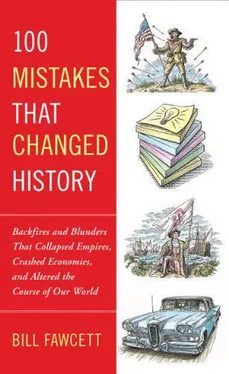At this point, the story slips into legend, with tales of Merlin the wizard woven throughout. Vortigern did not die in the massacre, but was killed later by Ambrosius, the exiled son of Constans. The legend does have a ring of truth to it, if only a literary one. It conveys the feelings of betrayal that the Britons felt toward the Saxon invaders, and it provides archaeologists and historians with a possible explanation for the sudden shift of power and the mass migration of the Saxons. The tale also offers a moral. So for all you men and women out there with plans of world domination, take a lesson from Vortigern, not to mention Rome: Never hire someone to fight your enemies. And if you do so, don’t allow them to achieve greater strength in numbers. The leader with the biggest army almost always ends up as king.
Another Time
771
In many ways the European Union is an attempt to set the clock for Europe back just over a thousand years. In 771, Charles became the sole king of a relatively small German kingdom whose capital was Aachen. In fifty-three military campaigns, and by having the distinction of being one of the most competent administrators in history, he was able to carve out an empire that was larger than anything Europe had seen since Rome. He worked hard all his life to create a prosperous and united kingdom, generally succeeding. Literacy grew, and the economy of central Europe, including today’s Germany and France, surged. But law and tradition waited to doom the first united Europe.
The law that put an end to one of the brightest periods in the Dark Ages was a long tradition that attempted to deal with the often murderous rivalry between the heirs of a king or other noble. This law decreed that any kingdom or noble’s holding was to be divided between all of the sons of a king. This may help minimize the rivalry between siblings, but it also meant that large viable kingdoms and fiefdoms were split and split again.

This was going to happen to Charlemagne’s empire on his death, but all the possible heirs except one, Louis, died before their father. So Louis became the sole ruler of the empire and also did a good job of ruling. Unfortunately, he also did an equally good job of begetting sons. His three, Pepin, Lothair, and Louis, all proved ready and anxious to inherit their third of the kingdom. They even accepted that they would have to share with their two brothers. But in 823 Emperor Louis’ second wife had a fourth son, Charles. When Louis tried to change his will so that the new son got a fourth part of the empire, the older sons organized a revolt within the palace. The conflict simmered and likely threatened to become open civil war. Louis tried to meet with Lothair, hoping to restore their relationship. When he arrived at the meeting place, all three of the older sons were there with their supporters. They forced Louis to abdicate. At this point, the empire was split into three parts, never to be united again.
Had the law been different, with one son inheriting, the history of Charlemagne’s family might well have been bloodier and all of Europe much more peaceful. If his empire had not been split apart by a tradition that created rival kingdoms every generation, a united Europe might have been the norm. Millions of deaths could have been avoided if the wars between the nations formed from the pieces of his realm would not have been fought. The unity that the European Union strives for might well have been achieved a thousand years earlier. That law, created to keep peace within a family, was a terrible mistake for Europe, and the continent paid for it with a millennium of chaos and war.
Family over Future
1001
There are many descriptions of Vikings written around the year 1000. Perhaps the mildest of them described the fearsome Norsemen as violent and impulsive. Most use very graphic and negative terms, which are used today to describe psychopaths and worse. Basically, the Vikings’ main pursuit for over two centuries was raiding, plundering, and taking over other people’s lands. The land stealing becomes more understandable if you consider the poor, rocky soil and frigid weather that dominates Scandinavia. So it took a real effort to stand out among the Vikings as being the most violent of them all. But one Viking was just that, and he was banished twice, until he ended up living at the far western edge of the entire European world. This Viking was called Eric the Bloody. Eric the Red is the more tempered translation, which is suitable for consumption by schoolchildren. Eric the Bloody managed to get himself banned to remote Iceland and then from all but a corner of that small island. But even after killing several neighbors in what should have been easily settled disputes over boundaries, the man had enough charisma to gather a group of followers and lead them even farther west. They settled on an island he called, more for good PR than reality, Greenland. The name stuck.
The settlement had Eric the Bloody as the acknowledged leader so at least there, no one could banish him again. The settlement thrived for a while, and Eric raised two children. These were Leif, called for obvious reasons Ericson, and Freydis Eiriksdottir (Eric’s daughter). Leif too was a leader and explorer. When old enough, he gathered a crew and sailed west again. It is likely Leif had heard accounts of a rich land to the west from native traders and fishermen. And after a surprisingly short sail, the Viking party landed on what must have seemed a verdant landscape after frozen Greenland. Leif named it Vinland, the fertile land.
As was the Viking habit, they decided to take the land where they had arrived as their own. Leif’s followers showed this by laying out a town and building stone houses. This upset the local peoples, who eventually attacked the settlement. They drove the small party back to their ships. The season was late so they returned to Greenland. This is when we first hear about Freydis, whose rage changed history. At this point she is a hero—well, heroine—fighting in the rear guard and helping hold back the far more numerous Native Americans until the boats could be launched. Women, particularly the daughters of higher-class Vikings were trained to use weapons. Since the men of a village might be away for weeks at a time raiding, this was almost a necessity.
Not long after his two children returned from Vinland, Eric the Bloody died. Leif took over as ruler of Greenland. He no longer could take the time to go exploring. But Vinland was not forgotten and another, stronger expedition formed to return there. There were more ships sailing west this time, and the way was known. They may have started together, but the ships sailed at different speeds, and some arrived sooner than others. Unfortunately for two families, their ship arrived earlier than the one Freydis was on. There was another Viking tradition. In abandoned lands, the first to arrive got to take their pick of the houses. Normally, those would be Saxon or British homes from which the owners fled, but the rule was applied to Vinland as well.
So when Freydis arrived at the site where she had been a hero, there was a problem. She was the daughter and sister of the king and hero of the retreat. Evidently, Freydis had her heart set on taking the largest and, most likely, best-made of the stone houses. But the two families who had arrived earlier had already moved into the one she had chosen. So Freydis ordered them out. They said no. The law was on their side. There was likely a real confrontation and many unfortunate things were said. It ended with Freydis, and possibly her personal guards, killing the two men who had moved in first.
Читать дальше













